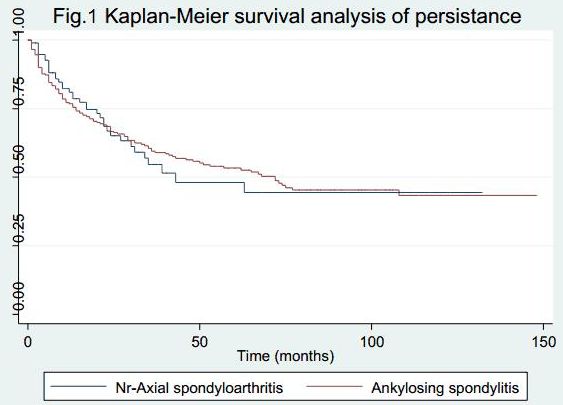Session Information
Date: Tuesday, November 10, 2015
Title: Spondylarthropathies and Psoriatic Arthritis - Clinical Aspects and Treatment Poster III: Therapy
Session Type: ACR Poster Session C
Session Time: 9:00AM-11:00AM
Background/Purpose: Several studies have demonstrated that Tumor Necrosis Factor Inhibitors (TNFi) are efficient in non-radiographic axial spondyloarthritis (Nr-AxSpA). However, few investigations have directly compared ankylosing spondylitis (AS) patients with Nr-AxSpA patients, and fewer still have compared response rates to first line TNFi treatment. The purpose of this study, which involved a tertiary care cohort, was to (i) evaluate baseline characteristics of Nr-AxSpA and AS treated by TNFi; (ii) assess the response to first-line TNFi treatment; (iii) compare drug-survival.
Methods: Inclusion criteria were patients with axial SpA (ASAS criteria) who initiated first-line TNFi treatment between April 2001 and July 2014 and followed up for at least 3 months. Efficacy criteria at 3 months were an improvement of at least 2 points (on a 0 –10 scale) or a 50% improvement in BASDAI. Baseline characteristics, responses at 12 months, and drug survival were compared between AS and Nr-AxSpA.
Results:
A total of 361 patients were included in the study (AS: n=263; Nr-AxSpA: n=98). AS patients were more often male (65.02% vs. 45.92%; p=0.001) and had longer symptom duration (11.71 ±9.52 vs. 7.34 ± 9.30; p<0.001). Median levels of acute-phase reactants (CRP and ESR) were significantly higher in AS patients (p<0.001 for both). Median BASDAI scores at first line TNFi initiation were not higher in Nr-AxSpA patients than in AS patients (59 [49-70] vs. 60 [50- 70]; p=0.73). BASDAI 20 and BASDAI 50 response rates at 12 months were not statistically different between AS patients and Nr-AxSpA patients (74.58% vs. 64.58%; p=0.19 and 61.02% vs. 50.00%; p=0.19 respectively). No statistically significant difference in terms of survival was observed between AS and Nr-AxSpA patients (p=1.00) (Figure 1).
Conclusion: Treatment response, drug survival and patient outcome in our study were similar in patients with AS and Nr-AxSpA after first line TNFi initiation.
To cite this abstract in AMA style:
Corli J, Flipo RM, Philippe P, Bera-Louville A, Wibaux C, Paccou J. Tumor Necrosis Factor Alpha Inhibition in Ankylosing Spondylitis and Non Radiographic Axial Spondyloarthritis: Treatment Response, Drug Survival and Patient Outcome [abstract]. Arthritis Rheumatol. 2015; 67 (suppl 10). https://acrabstracts.org/abstract/tumor-necrosis-factor-alpha-inhibition-in-ankylosing-spondylitis-and-non-radiographic-axial-spondyloarthritis-treatment-response-drug-survival-and-patient-outcome/. Accessed .« Back to 2015 ACR/ARHP Annual Meeting
ACR Meeting Abstracts - https://acrabstracts.org/abstract/tumor-necrosis-factor-alpha-inhibition-in-ankylosing-spondylitis-and-non-radiographic-axial-spondyloarthritis-treatment-response-drug-survival-and-patient-outcome/

